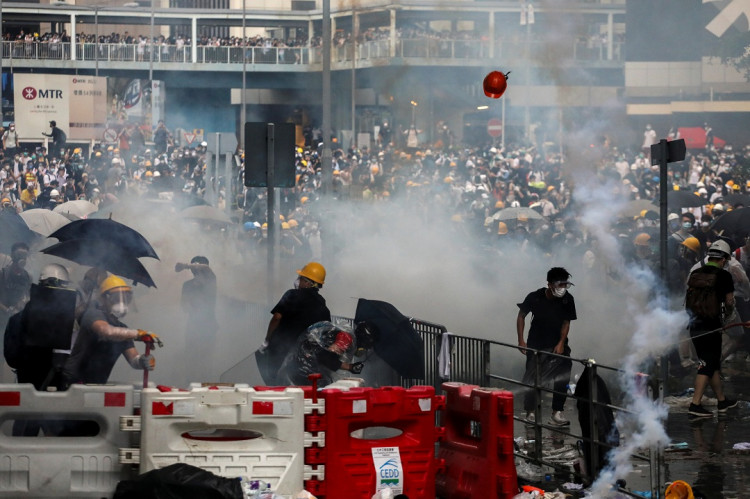Hong Kong Magistrates' Court judge Stanley Ho Chun-yiu will be put on desk duty next week after being accused of "pro-democratic bias" by members of the city's legal community, a move that came only weeks after Ho lambasted a police officer in court for "using a lie to cover up another lie" during the trial of district councillor Jocelyn Chau Hui-yiu and her assistant, Lao Chak-kin, for the alleged assault of an officer last year.
Two officers gave oral evidence in the case that was contradicted by video evidence shown in court, leading Ho to comment that "it was as if the two police officers were describing a parallel universe" in their portrayal of events. Both Chau and Lao were acquitted on August 12.
In June, Ho acquitted a student accused of possession of a weapon after being apprehended by police with a wrench, screws and a metal hook at a demonstration. That same month, he let three members of the Demosisto political opposition party off with fines of HK$1,000 each for disorderly conduct.
While Magistrates' Courts in the city handle a range of generally minor criminal cases, the number of protest-related cases being tried has risen dramatically over the last year as police crack down on dissenters. Magistrate-level cases are not tried before a jury, making the judge's decisions particularly critical.
Allegations of Political Bias
Five complaints had been filed against Ho accusing the judge of displaying political bias in his judgements, judiciary records show, including "failure to accept prosecution's testimony and light sentencing or acquittal of the defendant" in the case of Jocelyn Chau.
This echoes an anonymous letter alleging judicial misconduct by Ho that was sent to Hong Kong Chief Justice Geoffrey Ma Tao-li and widely shared on pro-establishment social media pages.
The letter writer, who describes themself as a local lawyer, complained about the large number of acquittals by the judge.
"Either it is an extraordinary coincidence that Mr. Ho was assigned cases the evidence for which all happened to be extremely weak, or that we are seeing an unusual pattern here, which can only be explained by the obvious reason," the letter author wrote according to a copy obtained by local newspaper The Standard.
In his new role as a criminal listing judge, Ho will be in charge of scheduling hearing dates. The new position comes with a significant pay bump – he is expected to make an additional HK$50,000 per month, according to local media reports.
Ho's removal from the Magistrates' Court follows days after another wave of minor protests engulfed parts of the city. On Sunday, people turned out to express their displeasure at the cancelled Legislative Council elections, which were due to take place that same day before being indefinitely postponed due to pandemic concerns.
This would not be the first time in recent months that a Hong Kong judge has been accused of blurring the line between judicial enquiry and political campaigning.
In April, District Court judge Kwok Wai-kin was censured for his remarks during the trial of a man who stabbed a journalist and two bystanders near a so-called "Lennon Wall" in the New Territories last year.
Kwok compared democracy activists to a "terrorist army" and praised the attacker as "an involuntary sacrifice and a bloodstained victim hanging by his last breath."
Cancelled Elections Spark Anger
The city's Legislative Council elections were due to take place this past weekend, and the pan-democratic camp was widely expected to succeed again after sweeping to victory in the district council polls in November 2019.
"No one knows ... whether the postponement will be extended, how the current legislature will be shaken up and how many pro-democracy incumbents will be arrested under the national security law," local activist Joshua Wong said on Twitter in response to the news.
At the time of the democrats' landslide win last year, Hong Kong Chief Executive Carrie Lam acknowledged that the people had spoken and vowed to listen to citizens' opinions. But a rash of protests persisted into early 2020 as the government and the public remained at odds.
"The decision to postpone the 2020 LegCo election has nothing to do with politics," the leader said in a July press conference, adding that "it has nothing to do with the likely outcome of this round of election."
Lam elaborated on her decision last week in the face of criticism from political opposition groups. "I announced the postponement on July 31 ... during the period when we saw successive daily cases of over 100. So that was a very critical period and the decision had to be made."
While the risks of bringing large groups of people together for the election were deemed too great, the government is going ahead with its mass testing scheme.
Nearly a million people have registered to get tested for the novel coronavirus at one of 141 community testing centers established around the region.





